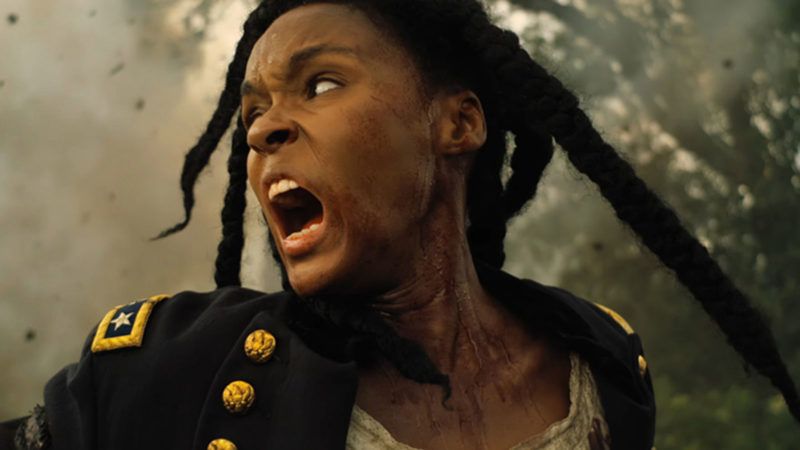Antebellum Is Empty Social Commentary Disguised as a Horror Movie
It's a one-note, one-twist concept in search of a story.

For decades, horror movies have been vehicles for social commentary. In 1968, director George Romero's genre-defining zombie film, Night of the Living Dead, served (perhaps inadvertently) as a parable about American racism; its '70s sequel, Dawn of the Dead, tackled soulless consumerism and suburban ennui. By the time the series reached the George W. Bush era, with 2005's Land of the Dead, Romero transformed the unending war between humans and zombies into a darkly comic riff on class division and wartime propaganda. His movies were tense, gory affairs about a fantastical otherworld in which the shuffling, flesh-eating undead regularly chased terrified civilians through homes and roads and shopping malls. They were also about the very particular, very normal real world that he, and his viewers, lived in.
Romero was far from the only director to inject political consciousness into genre filmmaking. In the 1980s, John Carpenter directed a string of beloved genre films—The Thing, Escape From New York, They Live—that reflected his left-leaning sensibilities. More recently, horror has tackled issues like familial trauma and mental health (Ari Aster's Hereditary) and domestic violence (Leigh Whannell's The Invisible Man), shading and sharpening prosaic horrors with genre thrills and chills. And thanks in large part to Jordan Peele, whose Get Out and Us directly overlaid the experience of present-day American racism onto horror tropes, the genre has continued to engage with issues of race and discrimination. Part of what made these movies effective was the balance between genre thrills and social commentary, the way that each enabled and expanded the possibilities of the other.
As big-budget Hollywood studio filmmaking has drifted away from socially and culturally engaged stories and concepts, except in the most superficial way, modestly budgeted horror movies have become one of the few places where these sorts of ideas are consistently explored in popular feature films. Indeed, it is now almost more surprising to see a horror picture that does not attempt some sort of social commentary; it is only a little bit of an overstatement to say that horror has become Hollywood's op-ed page.
Which brings us to Antebellum. The debut feature from filmmakers Gerard Bush and Christopher Renz, which recently debuted on video-on-demand, Antebellum is social horror movie that offers neither scares nor ideas. Instead, it's a one-note, one-twist concept in search of a story.
The film begins with a William Faulkner quote—"The past is never dead. It's not even past."—then opens onto a plantation run by Confederate soldiers where slaves are beaten, raped, and forced to perform punishing work in total silence. The central character is a slave, played by Janelle Monáe, who is plotting some sort of escape. But there's little in the way of narrative momentum or character development until the story eventually appears to shift gears.
Once again, we meet Monáe, but this time she's a successful contemporary author who goes on television to debate racial justice, gives TED Talk–style lectures to packed rooms, and casually works references to intersectionality into conversations. Obviously, there's a connection between the slave played by Monáe on the plantation and the author played by Monáe in the present day, a spiritual or metaphorical link between plantation-era slavery and the black lives of today.
To explain that link, however, would be to spoil the film's big twist, which—spoiler alert—is exactly what I'm going to do.
It turns out that the two Monáes are not connected by spirit or ancestry or anything so metaphorically indirect. Instead, they are literally the same person. The scenes of Monáe as a successful author are actually flashback, at the end of which she is kidnapped by a shadowy cabal led by a stalker played by Jena Malone, then brought to a present slave plantation that is operated for the pleasure of present-day racists, including, it turns out, a sitting U.S. senator.
That's it. That's the movie. There's barely a story. The characters are paper-thin. The plantation scenes are difficult to watch, and if anything seem designed to capitalize on the very abuses they nominally seek to critique. But they're not tense or frightening, nor even particularly illustrative, as in something like 12 Years a Slave; the scenes of grotesque violence do little to advance either a narrative or the viewer's understanding the world. Monáe's author character, meanwhile, has little to do except deliver pat mini-monologues about racial justice.
At every turn, Antebellum is flat, unpleasant, and empty. The entire film is just a delivery system for a twist whose entire unsubtle point could have been made in the space of a tweet. It's Faulkner's quote with handclap emojis.
Fair enough, you might say: Racism's legacy is neither subtle nor thrilling, but an omnipresent and awful reality. It's not made for entertainment. But a movie, especially a horror movie, isn't reality, and it has to give viewers a reason to want to watch. The most successful genre filmmakers take reality and recast it, shaping it into something else—a story, an idea, a parable, a portrait of a particular person. Romero's zombie films were visceral, white-knuckle affairs with sympathetic characters; Get Out escalates into a terrifying escape scenario; The Invisible Man draws viewers into a tense, high-stakes cycle of abuse and revenge. All of these films had thrills and ideas in balance, each working to prop up the other. Antebellum has neither enough ideas for an op-ed nor enough scares for a horror movie. It's an empty twist in search of grander meaning.
Directors Bush and Renz have described themselves as activist filmmakers dedicated to advancing social causes. But no amount of activism can save such shoddy, underdeveloped material—and from the looks of Antebellum, their activism has clouded their filmmaking judgment. There are no zombies to be found in their film, but politics seems to have eaten their brains.


Show Comments (76)